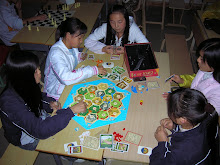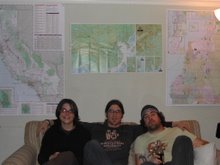I realized that I hadn't posted anything since we were in Hue, Vietnam and that it would be nice to give an overview of the rest of our trip.
We left Hue and on the bus to Hoi An and I realized there must be an invisible wall between the two cities which changes the climate. It remained warm the rest of our trip. Hoi An was very small and filled with tourists. We found a bookstore owned by an American ex-patriate named Randy and, when we left without books, he asked us why we didn't buy anything (in a friendly way). "We're Peace Corps Volunteers, and books are expensive, but we enjoyed looking!"
"I know how that goes," he replied, "I myself have been out on the road without money and..." and at this point he stopped because he looked up and off to the side, contemplating the days he had spent without much money. That's when he said, "You know what, take two books - no charge." We looked at each other as he walked back into the bookstore. After going back inside we left, happily clutching Franny and Zooey and The Alchemist.
Just before leaving the city we met a man who was born during the American War (Vietnam War). His father, a farmer, was killed by a bomb during the war before he was born. After working to save money, he eventually earned enough money to buy a couple motorcycles and bicycles, which he now rents to foreigners. We talked about what typical Vietnamese people pay for things, we talked about government, and we talked about his family. It was a rare moment when I felt a connection and an understanding. So much of Vietnam had been about paying for hotels, food, buses and everyone seeming to want our money, but this man treated us well unconditionally.
We took a sleeper bus to Nha Trang and then split a taxi with 3 German women so we could get to Jungle Beach, my favorite place in Vietnam during the vacation. The beach resort is run by a Canadian ex-patriate and, since it is so far from the city, provided 3 meals each day as part of the housing cost. The beach was 20 meters from our hut and there were very few people. I read two books in 5 days, climbed large river rocks up a hill to see several waterfalls, boogie-boarded, and traded stories with Austrians, Australians, Swedes, Germans, Canadians, Brits, and even some Americans. At the end of our time in Jungle Beach, the owner offered us two options: (1) Pay for the taxi back to town and catch a private bus to Dalat (our next destination) or (2) Go with him to Dalat, as he planned to go anyway. We chose the latter and got a chance to learn more about the future plans of the resort. We had to travel through the mountains to Dalat, and reached a high point of 1500 m. When we arrived the owner of the resort knew a hotel owner and was able to help us find a place to stay.
Dalat had an interesting night-life, with bustling markets and portable restaurants springing up on the street. We saw a strange, thick yellow liquid boiling and people sitting around drinking it. I asked Terrie if she wanted to try it and she replied, "Drink a strange, thick yellow liquid from a pot on the side of the street? Do you even have to ask?" So we sat down and tried it. The drink wasn't bad and, as it turns out, it was soymilk.
We met a group of Vietnamese students that night. They were talking together and they said "hello" as we passed so I stopped, turned, and approached them. Two chairs suddenly appeared from the crowd and we began talking about who they were and the places to see in Dalat. Later a student asked us if we were tired. We immediately understood, and said goodbye before returning to the hotel. Later we talked about this and decided that we may not have recognized their subtle signal had we not learned about this cultural difference while living in China.
Vietnam seemed to be a lot like China, except with French influences. Coffee, bread and cheese are all luxuries not easily found in China, but they were ubiquitous in Vietnam. Religion, Architecture, Food and Language were all influenced by French occupation.
Saigon was too big and too hot for relaxing. We checked out a couple of bookstores, searched the market for gifts, and to kill time decided to try a brief one-hour tour of the city. I found out that preparing to avoid being cheated is not enough, in itself, to actually avoid it. After a 35 minute tour, seeing "City Hall" and "A Pagoda," the Vietnamese were reaching out their hands for twice the price they quoted. I laughed out loud. I didn't argue or complain, as I'd grown used to this treatment in Vietnam. As I continued to laugh I handed 35/60ths of the REAL price (yes, i'm good with mentally calculating 12ths) and we walked away. It was the final punctuation of a series of people trying to cheat us throughout Vietnam. Although nobody else tried to cheat us, we had a strange encounter when we returned to Hanoi on our way back to China.
Our plane got into Hanoi late and we decided to wait for the small van to take us downtown for $4 rather than pay $18 for an immediate taxi. By the time we got to our hotel it was 12:30 a.m. Unfortunately the receptionists were unable to find our reservations. In an attempt to brush us off they asked for our reservation form, which I gladly showed them on the internet. They had no rooms, they said, they would call another hotel. After several calls they found a $28 room. "But we reserved a room here for $20," we said.
"This should be no problem for you," he replied.
This was the final, spoken explanation for an attitude we noticed while traveling: the people expected that we were rich and that money was not an object. This is frustrating as a volunteer, especially after I said, "We are volunteers, we don't have much money" and the receptionist replied, "I don't think so, money is not a problem for you." At this point I was livid and I wrote down our monthly salary for him. When he realized that, indeed, we made much less than he thought, he continued to call hotels. After another fifteen minutes we proposed sleeping in their dining room, which he quickly agreed would be the best solution. And so my last night in Vietnam was spent sleeping on a bunch of wooden dining chairs.
The only other exciting moment during our return was catching the train from Nanning to Guiyang. The bus pulled into Nanning at 7:00 p.m. and the train (300 meters away) left at 7:30 (we still didn't have tickets or very much money). We made a plan. I would run for the train station and Terrie would get all of the bags. In hindsight the opposite would have worked better, but there were unforeseen circumstances. For example, we didn't realize that the train station was so far away. In any case, the bus stopped and, tucking Terrie's wallet into my pocket, I sprinted for the station. When I arrived there were 10 people in each line. Several minutes later I asked for 2 hard sleepers to Guiyang. "They're all sold out," he said.
"How about 2 soft sleepers then?" I asked. Typically I wouldn't purchase a soft sleeper, as they are about twice as expensive, but we needed to catch this train.
"300 yuan," he said.
I handed him 300 yuan and he looked confused.
"It's 300 per ticket," he said. Panicked, I realized I was only about 10 yuan short.
"What do I do?" I asked, and he replied, "Just buy one now and you can get another later."
Again, when looking back, this makes no sense to me. We both needed to get on the train or neither of us did.
I left the ticket counters, went to the front of the station and saw a bag-laden foreigner stumbling toward the station. I took the bags from Terrie and told her to find an ATM and get money NOW. We needed to buy a second ticket. The time, at this point, was about 7:15 p.m. She came limping back ten minutes later with a handful of money, and she handed it to me distractedly as she examined her recently wounded shin. After falling on some rocks at Jungle Beach and spraining her ankle, she probably wasn't the best person to nominate for carrying 70 pounds of equipment and then sprinting for an ATM.
I bought another ticket and we boarded the train with minutes to spare.
After a couple nights in Guiyang we returned 'home.' I looked around the campus today and realized that virtually nobody is here. The empty, quiet campus has been pierced by the inexpensive firecrackers set-off by children. The small Post-Office door was slightly open and I inquired about packages:
Thank you
Grandma and Grandpa Ooley,
Mom and Dad,
Mike,
and, of course,
Megs.
Your generosity will not be forgotten!
I will spend the next week preparing for a Special Education lecture (which I will deliver sometime this month) and my upcoming classes. I'm looking forward to the campus regaining its life.
2.22.2008
Subscribe to:
Post Comments (Atom)








No comments:
Post a Comment